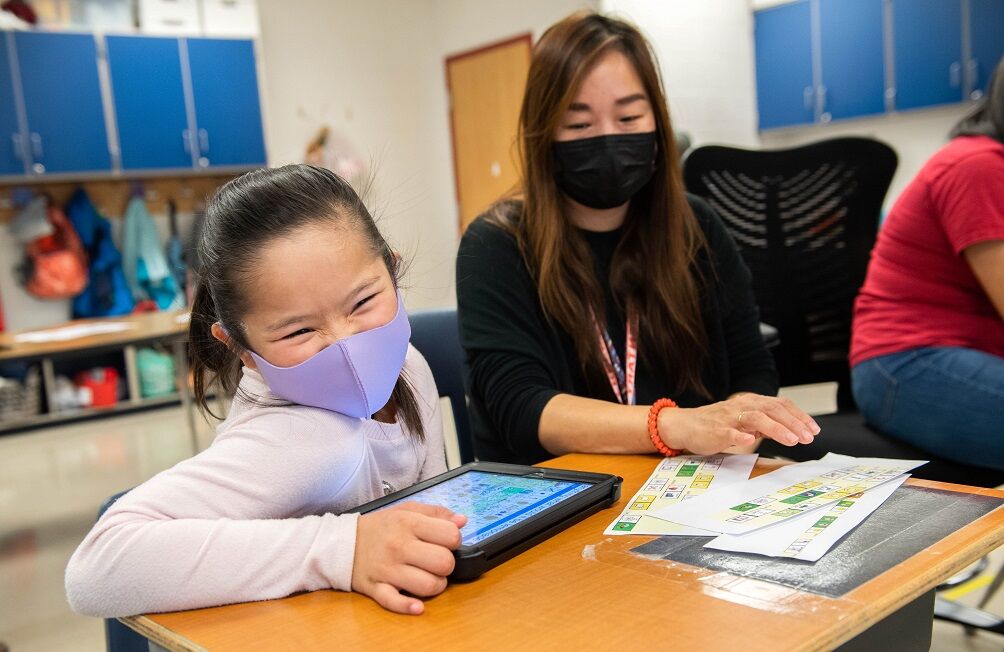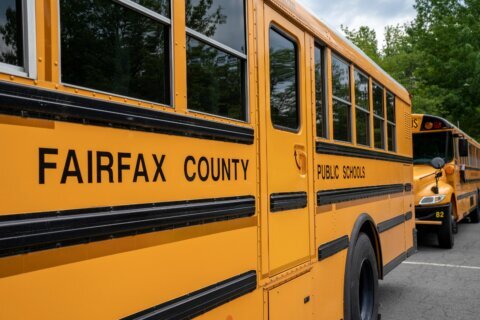As Fairfax County, Virginia, elementary school students concluded their weekly afternoon session with Thomas Jefferson High School for Science and Technology students on Wednesday, Mary Beth Fleming was blown away by how some younger students said goodbye.
A partnership with students involved with the TJ Assistive Technology Club and local elementary schools offers high schoolers the opportunity to work with low incidence communicators, nonverbal students or those with minor verbal abilities. But Wednesday, Fleming said, some students signed off a video session by sharing messages like “I love you, friend” and “Thank you, don’t go.”
“We did not teach them that,” Fleming, who works in assistive technology services for the school system, said. “I didn’t even teach them the contraction that ‘do’ and ‘not’ are ‘don’t’ together. … For our kids that can have a delay in communication, for them to be able to independently express that, it’s really awesome.”
The TJ Assistive Technology Club, which Fleming said has been operating for about 18 years, started working with elementary students about six years ago, when Fleming brainstormed the idea with her husband, Eric, who also works in assistive technology services for the school system. Now, it aims to help younger students communicate through games and other activities.
The high school students gain experience with coding while they prepare each week’s activities, and the elementary students are able to practice communicating outside of class during the weekly sessions.
The students meet every Wednesday for a Zoom session at 2:30 p.m. But before the sessions, the Thomas Jefferson students work together over the weekend to develop activities in collaboration with the elementary teachers. Currently, the club works with Freedom Hill and Vienna elementary schools.

Sometimes, the activity can involve a digital book, or feature a game like truth or dare. The group tries to avoid repeating an old activity.
Vivian Denny, a junior and the club’s co-president, said an activity deemed the “happiness meter game” was especially well-received. The game displays sentences and asks the elementary students to identify the happy option.
Another activity, a tarot card reading game, provides students with a fortune that includes a question, which the students then have to answer.
“It has been such a rewarding experience for me just seeing the kids develop and grow up and become a little more independent with how they respond to things,” said Catherine Nguyen, another co-president. “We would often create open-ended prompts or questions, and they would respond with how they were feeling or what they were doing that day all on their own, rather than us giving them a prompt to read them.”
To participate in the dialogue, the elementary students use modified tablets, Jeff Sisk, the school system’s assistive technology manager, said. Each device is programmed based on each student’s physical and communication abilities.
Most students have devices that feature a complex program, with up to 3,300 installed words, said Eric Fleming. The county, he said, has used research to determine the best way for nonverbal students to learn involves using core words, which primarily include verbs, adjectives and pronouns.
“[The device] basically has 3,300 words that are available to the kids within three touches,” Eric said, “so it’s pretty powerful room for growth.”
Before the pandemic, Eric and Mary Beth said, a field trip was planned to get all of the students together. And while the pandemic has kept the interactions virtual, the students’ growth remains evident.
“These kids, a lot of times, were super shy,” Eric said. “Over time, the confidence has gone there, it’s grown so much. They’re super excited and active, which is why you’re getting these ‘bye’ and ‘miss you’ or ‘don’t go’ kind of comments.”








